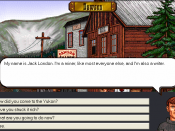The ignorance of the main character in To Build a Fire by Jack London is what ultimately causes his failure. He has never experienced cold like that of the Yukon Trail but is confidant, regardless, that he will reach his goal of meeting his friends at the campsite. It is the man's determination to follow his intellect rather than his instinct that reveals his ignorance.
The man begins his journey relying on flawed intellect. He illogically treks through snow, wetting his boots and feet, and must dry them before they succumb to frostbite. When the dog's feet get wet, it instinctively licks and bites at the ice that forms between its toes. The man helps the dog, briefly removing his mitten in the numbing cold. The man does not take the same precautions, he continuously ignores his instinct.
The man's second accident occurs when he proceeds to build a fire under a snow covered tree, which begins to melt and blots the fire out.
Logic is eluding him and his confidence begins to dwindle, as his journey quickly turns to failure. The old man never learns from his mistakes, and his failures compound. London writes that this second mistake was his "own fault or, rather, his mistake." Here London is showing his beliefs as a naturalist. Had this second problem been his "fault" the author would be condemning his protagonist much more strongly; however, he calls this a mistake, a much softer term, suggesting that the man should not be held liable for his actions. Had he anticipated that lighting a fire under a frost-covered tree would cause the heavy ice to melt and fall, yet still done it, only then would he be held liable.
The man's mind begins to run wild with thoughts of insecurity and death when...



Disagree
I Wrote a simialar essay for scool late last year and some esential points were missed such as the mans lack of imagination and his lack of fear. I personaly felt the essay was pourly writen.
3 out of 3 people found this comment useful.